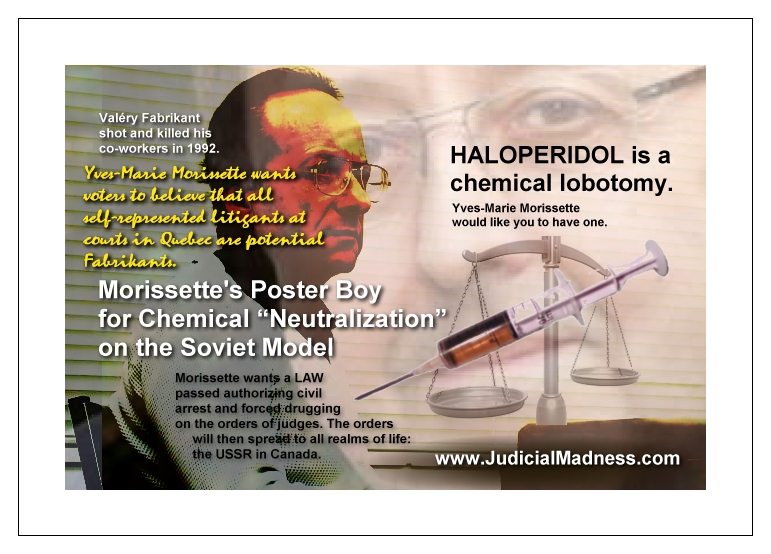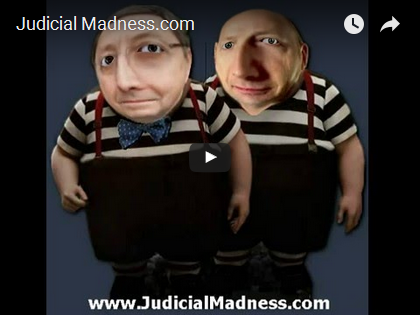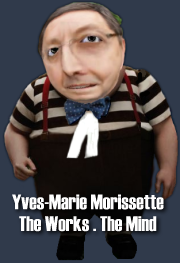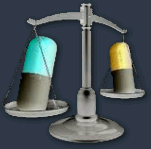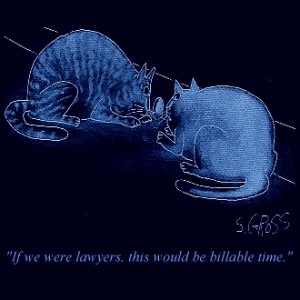Extreme Behavior

DOSSIER: EXTREME BEHAVIOR
|
1. |
Extreme Behavior |
2. |
Extreme Behavior – “Querulousness” by Dr. Jacques Gagnon |
3. |
Extreme Behavior – “Judicial Control of Querulous Litigants” by Mr. Justice [sic] Yves-Marie Morissette |
4. |
Extreme Behavior – “A Portrait of Querulous Behavior” by Le Spécialiste “with the kind collaboration of Mr. Justice Y.-M. Morissette” |
| 5. |
Elsevier – “Evaluation de la dangerosité du malade mental psychotique” / “Dangerousness evaluation of psychotic patient” by F. Millaud and J.-L. Dubreucq, Psychiatrists. (Available online in 2005) [This is a French article with a bilingual abstract. Judicial Madness has provided an exclusive English translation of the article.] |
1.
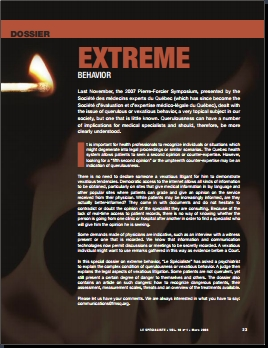
Extreme Behavior – Introduction
Source: Le Spécialiste, The FMSQ Magazine Vol. 10 no. 1 – March 2008, EXTREME BEHAVIOR, Querulousness and Vexatious Behaviors, Dangerous Behavior (Cover). Download the English edition of the magazine here: Vol 10 no 1 Le Spécialiste, The FMSQ Magazine Vol. 10 no. 1 – March 2008. Special issue featuring a “Dossier” on EXTREME BEHAVIOR
Download the French edition of the same magazine here:
EXTREME
BEHAVIOR
Last November, the 2007 Pierre-Forcier Symposium, presented by the Société des médecins experts du Québec (which has since become the Société d’évaluation et d’expertise medico-légale du Québec), dealt with the issue of querulous or vexatious behavior, a very topical subject in our society, but one that is little known. Querulousness can have a number of implications for medical specialists and should, therefore, be more clearly understood.
It is important for health professionals to recognize individuals or situations which might degenerate into legal proceedings or similar scenarios. The Quebec health system allows patients to seek a second opinion or counter-expertise. However, looking for a “fifth second opinion” or the umpteenth counter-expertise may be an indication of querulousness.
There is no need to declare someone a vexatious litigant for him to demonstrate vexatious tendencies. Democratic access to the internet allows all kinds of information to be obtained, particularly on sites that give medical information in lay language and other popular sites where patients can grade and give an opinion on the service received from their physician. While patients may be increasingly informed, are they actually better-informed? [sic] They come in with documents and do not hesitate to contradict or doubt the opinion of the specialist they are consulting. Because of the lack of real-time access to patient records, there is no way of knowing whether the person is going from one clinic or hospital after another in order to find a specialist who will give him the opinion he is seeking.
Some demands made of physicians are indicative, such as an interview with a witness present or one that is recorded. We know that information and communication technologies now permit discussions or meetings to be secretly recorded. A vexatious individual might want to use remarks gathered in this way as evidence before a Court.
In this special dossier on extreme behavior, “Le Spécialiste” has asked a psychiatrist to explain the complex condition of querulousness or vexatious behavior. A judge then explains the legal aspects of vexatious litigation. Some patients are not querulent, yet still present a certain degree of danger to themselves and others. The dossier also contains an article on such dangers: how to recognize dangerous patients, their assessment, measurement scales, threats and an overview of the treatments available.
Please let us have your comments. communications@fmsq.org. We are always interested in what you have to say.
Admin Notes, Judicial Madness
Bold and underlines have been added by me, your lone editor.
The review, Le Spécialiste, did not publish or re-publish the “article on such dangers” in this issue. It claimed that the article was not available on the Internet, and was in French only. That was back in 2008 when this “Dossier” (above) was published.
However, I found a copy online, which states that it has been online since 2005. The French title is: “Evaluation de la dangerosité du malade mental psychotique“. It also has an English title” “Dangerousness evaluation of psychotic patient”, and an Abstract in English, but the rest of the article is in French. It is now available at Judicial Madness in French, side by side with my English translation.
